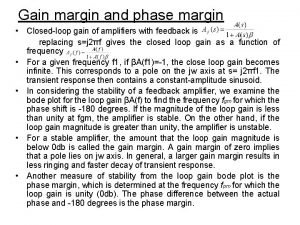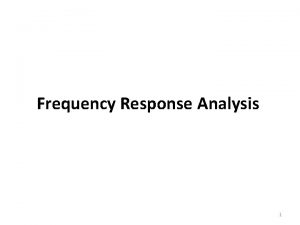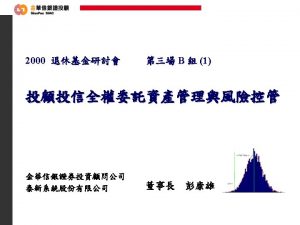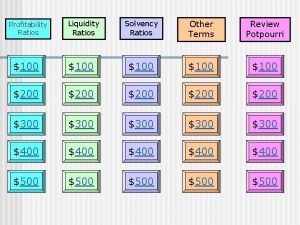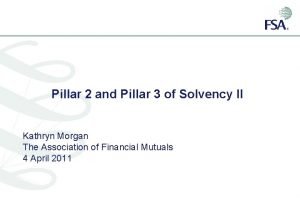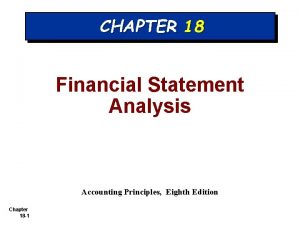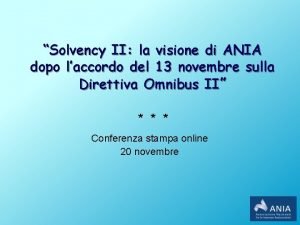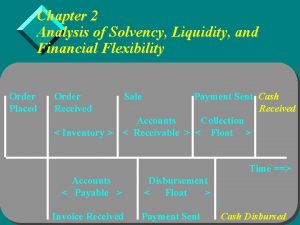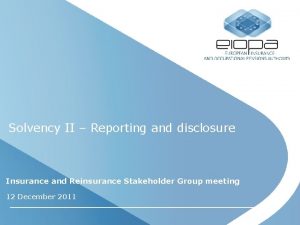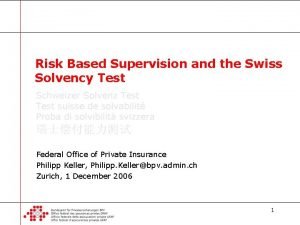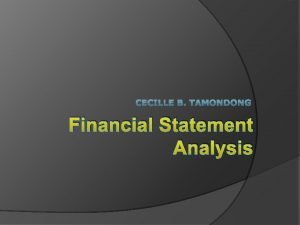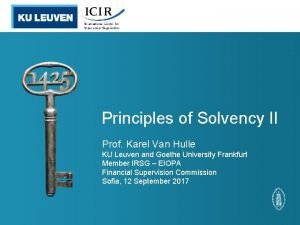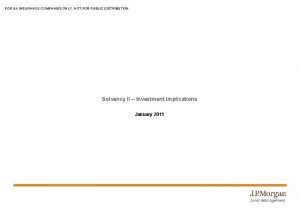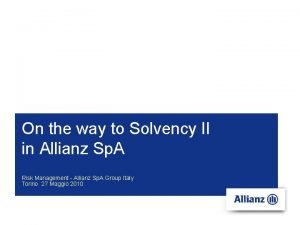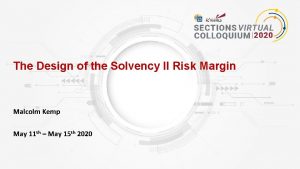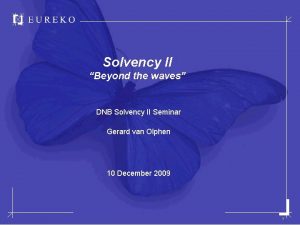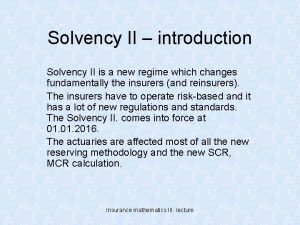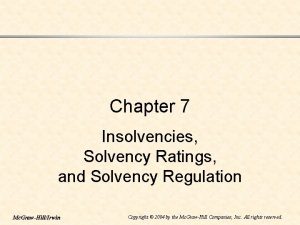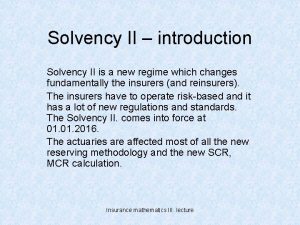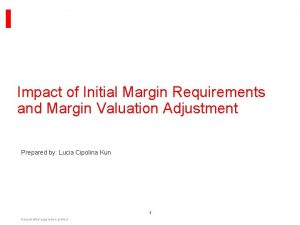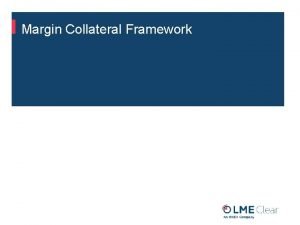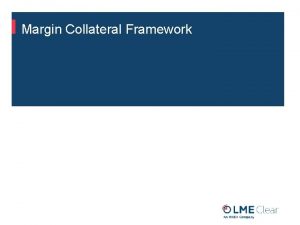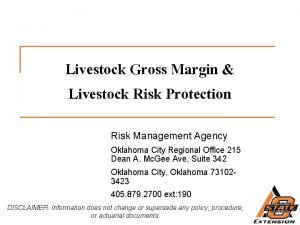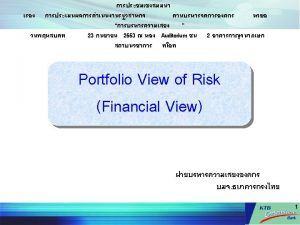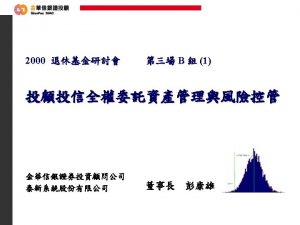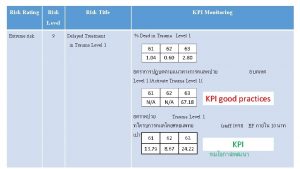A review of the risk margin Solvency II



















- Slides: 19

A review of the risk margin – Solvency II and beyond Report by the Risk Margin Working Party Presentation by: Andy Pelkiewicz Paul Fulcher Staple Inn, 9 September 2019

The Risk Margin Working Party • Set up following criticisms of the Risk Margin in the Treasury Committee Inquiry into EU Insurance Regulation • Two main strands: – What can be done to fix known issues with the RM, either within Solvency II or using potential post-Brexit flexibility? – What should be the purpose of the RM, and how can that purpose best be fulfilled? • Members: – Andy Pelkiewicz (Chair), Waqar Ahmed, Paul Fulcher, Katie Johnson, Stuart Reynolds, Richard Schneider*, Andy Scott * Also acts as the Life Research Committee shadow 2

Development of the risk margin 3

Development of the risk margin 4

Development of the risk margin 5

Transfer to the Reference Undertaking • No assets or liabilities before the transfer • Remains closed after the transfer • De-risks assets so as to minimise market risk No • Subject to Solvency II on an ongoing basis. It therefore raises sufficient capital to cover its SCR • Reinsurance transfers with business • Adopts management actions consistent with original insurer 6

The Solvency II risk margin formula • • 6% Risks included Underwriting risks Residual market risk Counterparty default risk Operational risk Risk-free rate 7

Variation of risk margin with risk-free rates Source: Working Party modelling 8

Variation of risk margin as proportion of BEL with risk-free rates The RM / BEL ratio for Dec 2015 is 7. 7%. This is shown as 100% in the graph. Source: Working Party modelling 9

Extracts from the Treasury Committee report • … the Committee considers that the PRA, working in close collaboration with the industry, should … provide a solution for the risk margin to improve its calibration … • A Risk Margin … makes conceptual sense. … It should continue to form part of the UK’s solvency regime. However, the previous Committee heard widespread criticism of the Solvency II Risk Margin as it is currently formulated. The regulator has acknowledged these criticisms. There is widespread grasp of the problem among regulators and the issue is being reviewed by EIOPA and the European Commission. But in the meantime UK business is being reinsured overseas. … For these reasons, many respondents and technical experts are advocating that the PRA take action now, irrespective of the Commission review process. The Committee concurs … 10

Qualities of a desirable risk margin Policyholder protection Market consistency Objectivity Applicability to different risks Practicality (ease of implementing change) (now) Avoiding pro-cyclicality ? Consistency with IFRS 17 Consistency with ICS Solvency II equivalence post Brexit Creating appropriate incentives ? Theoretically sound Source: Groupe Consultatif, 2006 (for 6 criteria in green) – these have been paraphrased for ease of presentation ? 11

Options for change – within Directive Proposal Justification What needs to change Lower cost of capital from 6% Simplest change to reduce magnitude of issue Level II Delegated Acts Vary cost of capital with interest rates Reduces (artificial) volatility and some theoretical evidence Level II Delegated Acts MA or VA used for SCR Consistent with BEL (but market risk was assumed to be derisked) EIOPA Guidelines MA or VA used to discount cost of capital Insurer should be able to earn illiquidity premium on capital held Level II Delegated Acts Tapering of lifetime risks Lifetime risks are not independent Level II Delegated Acts or Internal Model Link to reinsurance pricing Market consistent and removes artificial incentives to transfer Level II Delegated Acts or PRA acceptance of management action 12

Risk Margin (as percentage of BEL) Comparing options - Magnitude Incorporate spread risk into RM calc 12% 10% 8% 6% 4% 2% 0% Base position Source: Working Party modelling As at 31 December 2018 Indicative reinsurance pricing Co. C = 4% / 7. 8% Use MA in SCR Tapering (97. 5%) calc and Co. C disc rate 13

Comparing options - Volatility Source: Working Party modelling 14

Assessing the alternatives (1) Reduce Co. C varies with rates Allow for MA or VA Cost of reinsurance Policyholder protection ? ? Market consistency ? ? ? Objectivity - - - ? Applicability to different risks - - - Ease of implementing change - ? Avoid pro-cyclicality ? - - Consistency with ICS ? ? Solvency II equivalence ? ? ? Appropriate incentives - Theoretically sound ? ? Consistency with IFRS 17 15

Options for change: more fundamental Proposal Justification and precedents Run-off percentile Own fulfilment value rather than exit value Precedent: Original option in Solvency II (75%ile), Australia non-life, IFRS Provisions for Adverse Deviation Prudent margin on BEL assumptions Precedent: Traditional actuarial approach, China C-ROSS “Value-at-risk” 75%ile (2/3 rds standard deviation) for risks Precedent: ICS P-MOCE, Hong Kong and other Asian RBC regimes Replace RM + SCR with “run-off” capitalisation Align total capital with the long-term ability to meet liabilities as fall due No Risk Margin Still 50% probability of meeting benefits post “ 1 -in-200 year” SCR shock Precedent: Superfunds, Lloyds market 2 nd test Precedent: Solvency I Pillar II (ICAS) regime 16

Assessing the alternatives (2) Run-off %ile Va. R (P-MOCE) Run-off capitalisation No risk margin Policyholder protection - - Market consistency ? ? ? Objectivity - - Applicability to different risks - - - Ease of implementing change Avoid pro-cyclicality - - - Consistency with IFRS 17 ? Consistency with ICS Solvency II equivalence - ? ? Appropriate incentives ? ? ? - Theoretically sound 17

Working Party Conclusions: possible options for change • allow for an automatic change in the assumed cost-of-capital rate when risk-free rates change; • allow a prudent illiquidity premium to be used in the calculations of the projected future SCRs and in the risk-free rate used in discounting the future costs-of-capital; • allow certain longevity risk to be treated as hedgeable and the relevant part of the risk margin to be replaced by the cost of the hedge; or • move to, or to allow as an alternative, the Percentile-MOCE, which is being considered under ICS. 18

Questions Comments The views expressed in this presentation are those of invited contributors and not necessarily those of the IFo. A. The IFo. A do not endorse any of the views stated, nor any claims or representations made in this presentation and accept no responsibility or liability to any person for loss or damage suffered as a consequence of their placing reliance upon any view, claim or representation made in this presentation. The information and expressions of opinion contained in this publication are not intended to be a comprehensive study, nor to provide actuarial advice or advice of any nature and should not be treated as a substitute for specific advice concerning individual situations. On no account may any part of this presentation] be reproduced without the written permission of the IFo. A 19
 Risk margin solvency ii
Risk margin solvency ii Phase margin and gain margin
Phase margin and gain margin Corner frequency
Corner frequency Market risk credit risk operational risk
Market risk credit risk operational risk Solvency formula
Solvency formula Solvency 2 pillar 2
Solvency 2 pillar 2 Solvency ratio accounting
Solvency ratio accounting Solvency ratios
Solvency ratios Solvency ii ania
Solvency ii ania Liquidity profitability and solvency
Liquidity profitability and solvency Liquidity profitability and solvency
Liquidity profitability and solvency Inherency debate definition
Inherency debate definition Rsr solvency ii
Rsr solvency ii Swiss solvency test
Swiss solvency test Solvency forecasting method
Solvency forecasting method What is vertical financial statement analysis
What is vertical financial statement analysis Solvency ii
Solvency ii Liqudity ratio
Liqudity ratio Solvency ii ppt
Solvency ii ppt Allianz solvency ii
Allianz solvency ii

